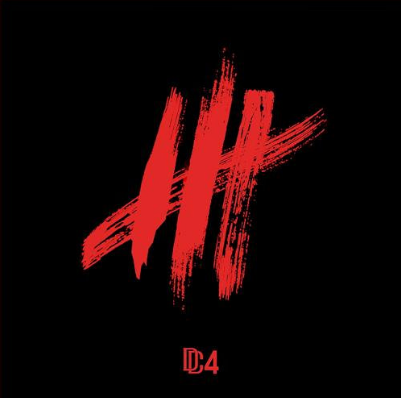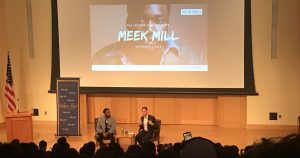It has been over a year since rapper Meek Mill released a full-length studio album, but the Philadelphia-based rapper has certainly remained a relevant name in the hip-hop world. Since the July 2015 release of his sophomore-project, Dreams Worth More than Money, Meek has been in a highly public beef with superstar rapper Drake over the 6-God’s alleged use of a ghostwriter. Despite producing several singles aimed at his adversary, many proclaimed Meek dead after Drake’s onslaught of diss tracks (“Back to Back,” “Right Hand,” and “Charged Up”) His Twitter wounds now healed, Philly’s most notorious rapper has returned with his long-awaited album, Dreamchasers 4. While the project is uplifted by some of Meek’s best work to date, it is simultaneously some of his most puzzling and, quite bluntly, horrible music he has released. In the end, many listeners will be able to find multiple singles to bump on DC4, but as a cohesive work, it is simply average when compared to Meek’s past releases.
One of the most notable features of any Meek Mill project is the presence of an anthemic intro track. DC4 is no different, as the single “On the Regular” delivers free-flowing bars over a choir-filled beat filled with heavy doses of bass. It’s clear that Meek hasn’t lost a step in terms of his flow, and his delivery on the song is masterful. “On the Regular” is certainly cause for increased expectations for the rest of the album.
The album is front loaded, as the intro is followed by three of the album’s more impressive tracks. “Blessed Up” offers up a less epic, but equally exciting track. “I got God watchin’ over me from courtside/ballin’ like I’m Jordan ‘cause I’m blessed up,” is sure to go down as one of the most catchy hooks of 2016. The first feature of the album appears on the song “Litty,” which is arguably the biggest banger on the entire tracklist.Tory Lanez provides a refreshing hook and verse in his usual autotuned style, and the bass drops so hard in this song that it could very possibly lead to multiple speakers malfunctioning. Of all the songs on the album “Litty” is probably the single that will find the most commercial success, as the upbeat instrumental, effortlessly smooth delivery, and surprising guest hook combine to make this the go-to party track on the album.
The song “Shine” stands in contrast to “Litty” as it takes a more introspective look at Meek’s journey to success. He discusses losing friends, using drugs, and even harps on police violence with bars such as “They don’t give a f*ck about us, put us in a cage/let us out with that parole, man, this shit a maze/RIP to Snupe, RIP to Scooter/RIP to Dex, told him not to be a shooter.” After listening to the first four songs, one may be under the impression that DC4 could be a career-defining album.
The middle of the album provides a variety of decent singles, but the momentum generated comes to an abrupt halt with the song, “Froze,” which features fellow Philadelphia rapper Lil Uzi Vert and Nicki Minaj. A weak hook from Uzi is followed by subpar lyrics, a boring beat, and a disappointing verse from Minaj. Similarly, the single “Way Up” featuring Tracy T contributes an incredibly simple beat and repetitive hook that simply fail to impress. Combined, these two songs make it extremely difficult to recall the brilliant opening of the album.
Luckily for Meek, the album ends nearly as strongly as it started. “Two Wrongs” features a beautiful chorus from Guordan Banks, who sings “They say two wrongs don’t make a right/But if it’s my blood, someone has to die/ Cause in the street life you got to sacrifice/This is either my life or your life.” Pusha T, the most high-profile feature on the album, offers a powerful indictment of mass incarceration and outdated crime policies. “Nancy Reagan raised a monster/they say that Ronny armed the Contras/all that shit without a conscience/so why should I have a conscience?” Pusha rhymes. By the end of the song, the listener is left contemplating the merits of the street life and urban warfare that Meek confronted while growing up.
The penultimate track of DC4 is sure to please long-time Meek Mill fans, as “Tony Story 3” presents the third chapter in Meek’s most recognizable series of songs. In this installment, Paulie is shot by the police and taken to jail, where he will be forced to confront Tony’s cousin, who were both murdered by Paulie in chapters one and two. The track once again demonstrates Meek’s ability to tell a vivid and cohesive story. He concludes by promising that part four will be a movie, which will certainly generate buzz amongst listeners.
“Outro” featuring French Montana and the late Lil Snupe closes out the album in spectacular fashion. The first half of the song features Meek’s impeccable cadence layered over a rapid succession of bass, while the second half showcases an equally satisfying, although less complex, instrumental. As a whole, the song encapsulates what DC4 could have been, had it not been weakened by the worst performances Meek has offered to date.
DC4 gives fans of Meek Mill reason to be excited about the future. Meek solidifies his place as one of the most skilled artists in regards to style and command of his bars, and he delivers powerful singles on over half of the album’s tracklist. Unfortunately, it is simply impossible to overlook the dud performances that made the final cut. DC4 offers three courses for fans to feast on, but only the appetizer and dessert live up to the hype. Ultimately, Dreamchasers 4 will be remembered for its great singles rather than its validity as a complete work, for its lack of an immediately cohesive theme and periods of repetitiveness restrain it from reaching its true potential. Still, one can see the talent Meek possesses, even if he has been unable to translate that talent into a career-defining album.






